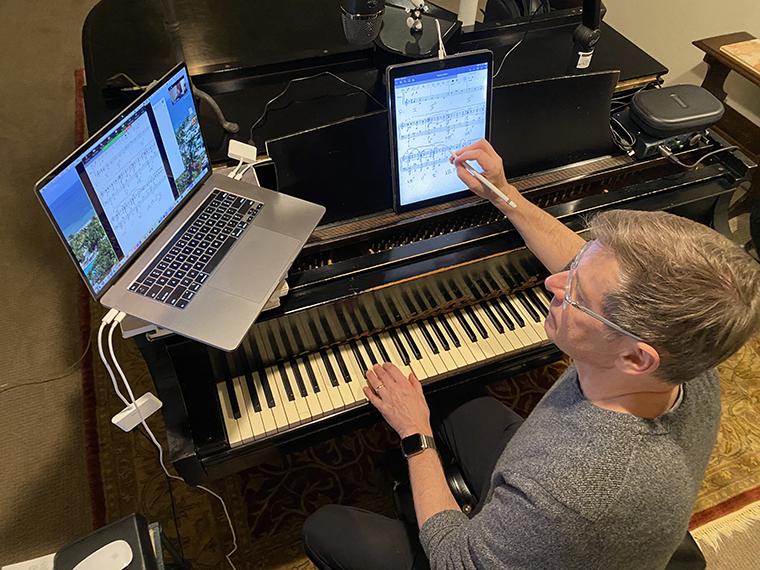by Mike Telin

“The intergenerational possibility of these classes is something we are promoting,” Joseph Lubben, executive director of OC Global and associate professor of music theory at Oberlin, said during a Zoom interview. “I think a number of institutions around the world understand that one part of classes like these is connecting to the local community. Another part is connecting to their alumni who also cross all generations. I’m very excited about all of that — but it’s new territory for Oberlin.”
Initial OC Global offerings include programs dedicated to music theory and pedagogy, a guide to technology-assisted musical collaboration, topics in advanced string playing, and a course dedicated to the enduring impact of 1970s rock and roll. They vary in duration from four days to six weeks, and sessions take place primarily in the evening. Fees range from $150 to $250 per program. The list of offerings is below.
Lubben said that all of the classes have the potential to attract a range of participants from high school students to octogenarians. “I think it’s exciting because as a professor, all these topics are not only interesting to 18 to 20 year olds. Teaching a class about innovation and ingenuity in music during the 1970s is already appealing to people who were young in the 1970s — I count myself among that group — but also my older siblings who are now retired.”
When it came to deciding which classes would be offered, Lubben said he was happy with the final list. “What I had hoped for, we ended up with. There’s a wide variety of offerings that are being taught by top-notch professors — we didn’t want to quickly hire someone to fill this online thing we’re doing. We wanted it to be the best that Oberlin Conservatory can offer.”

In our second article, Lubben will discuss the circumstances that led to the creation of OC Global.
***
Ingenuity and Innovation: How Rock and Roll Splintered in the 1970s
Intended for lifelong learners of all backgrounds.
Teacher: Assistant Professor of Ethnomusicology Kathryn Metz
Dates: June 7-July 7 (five Monday sessions, each 7:30-8:30 p.m. ET, plus five additional recorded sessions)
Fee: $200
The 1970s saw a dramatic shift in styles, technologies, and consumption of popular music. The rock industry coalesced while genres splintered, pushing listeners into marketable boxes. This course uncovers the layers of 1970s political, social, and cultural shifts that continue to shape and reshape rock and roll and its branches: hip-hop, prog rock, electronic rock, synth pop, glam, arena rock, disco, soul, R&B, punk, and more.
Tools for Online Musical Collaboration
Intended for teachers, advanced students, and lifelong learners interested in online collaboration.
Teacher: Associate Professor of Conducting and Director of Vocal Ensembles Gregory Ristow
Dates: June 14-17 (7-8:30 p.m. ET Monday-Thursday)
Fee: $150
Not so long ago, making music with collaborators around the world seemed all but impossible. This class fully explains how to enjoy real-time, low-latency collaborations—and without the need for expensive equipment or software. The course introduces cutting-edge programs that allow for singing and playing together from afar, opening up new worlds of creative artistry. Areas of focus include establishing low-latency connection, techniques for optimal audio transmission, use of the peer-to-peer program SoundJack, and creating successful recordings.
Intended for music teachers at all levels, including private teachers, those considering private teaching, and those who seek to engage diverse music learners of all ages; as well as for lifelong learners.
Teachers: Professor of Music Education Jody Kerchner and Associate Professor of Piano Pedagogy Andrea McAlister
Dates: June 10, 17, and 24 (7-8:30 p.m. ET each day)
Fee: $250
This course offers opportunities to hone skills in the basics of general music teaching practices, based on psychological and pedagogical research and the facilitators’ years of teaching experience. These ideas are applicable to all music teaching settings—regardless of instrument, voice, or group size—as well as for lifelong music learners. Participants read pedagogical materials and view video modules independently, then bring questions and observations to weekly online meetings that emphasize discussion and application of the key strategies covered.
Intended for students entering College Music Theory I or AP Music Theory in fall 2021, as well as lifelong learners.
Teacher: Associate Professor of Music Theory Joseph Lubben
Dates: June 21-July 30 (live workshops, recorded videos, and weekly assignments)
Fee: $250 (Fee will be waived for incoming Oberlin College and Conservatory students.)
This six-week fundamentals course is designed to prepare students to excel in conservatory-level music theory studies. It consists of one weekly prerecorded lecture, one weekly live workshop with small groups, and structured self-study using the online instructional platform uTheory. Students develop fluency with clefs, intervals, rhythm and meter, scales, and chord types, and are exposed to foundations of musical form, approaches to timbre, a variety of analytical perspectives, and a diverse repertoire.
A More Excellent Way of String Playing
Intended for advanced-level high school, college, and graduate-level string players; professionals; and teachers.
Teacher: Professor of Viola Peter Slowik
Dates: July 26-August 5 (8-9:30 p.m. ET Mondays, Wednesdays, and Thursdays)
Fee: $200 (or $250 with an optional one-on-one coaching session with Slowik)
From professionals searching for a renewal of the joy of practicing, to teachers seeking seasoned shortcuts to excellence, to advanced students looking to fully unlock their talent, Slowik’s engaging and challenging approach—“teaching from the inside out”—is designed to enlighten and inspire advanced players of all backgrounds. The course blends teacher presentations with student interaction and covers topics including energy flow and the body, sound production, fingerboard geography, and phrasing.
Published on ClevelandClassical.com May 19, 2021.
Click here for a printable copy of this article



